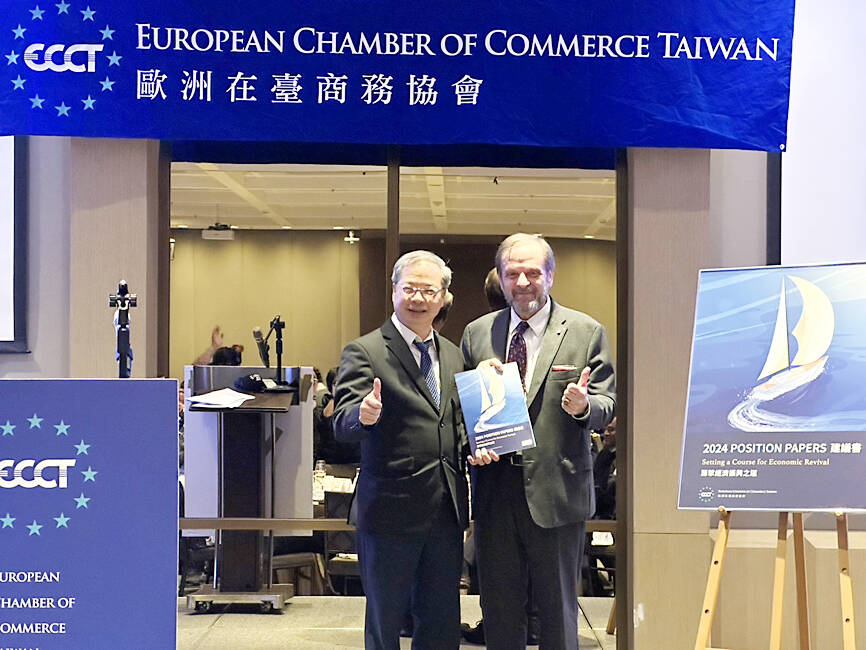The European Chamber of Commerce Taiwan (ECCT) released its annual position papers on Thursday, in which it proposed recommendations mainly in the areas of energy, talent and internationalization to help boost the nation’s business environment.
ECCT chairman Giuseppe Izzo said this year’s report, titled Setting a Course for Economic Revival, included submissions from 25 ECCT committees and raised 175 issues, including 67 not previously included.
“Taiwan’s economy is facing headwinds and choppy seas and the outlook for 2024 is uncertain,” Izzo said, stressing that due to uncertainties Taiwan needs to chart a clear course to help it “avoid the worst conditions that are beyond its control” through removing regulatory constraints, revising unsuitable laws and regulations and streamlining administrative procedures.

Photo: CNA
Energy, talent and internationalization are the three main issues raised in the paper, the chamber said.
Izzo called for the “prioritization of renewable energy capacity expansion,” especially in the field of offshore wind power, saying official targets have not been met due to “local content requirements, regulatory red tape and difficulties in financing.”
The chamber recommends revising rules to spur local supply chain competitiveness, streamlining the permit process and liberalizing the energy market, he said.
Regarding energy, the ECCT called on the government to support the country’s transition to transport powered by electricity, particularly by removing regulations that are slowing the installation of charging infrastructure.
Regarding expanding Taiwan’s talent pool, Izzo said Taiwan continues to face shortages of skilled and semi-skilled domestic and foreign workers due to shifting demographics, and overly restrictive labor laws and visa and work permit rules.
Family-friendly policies, for example, should be further promoted, the chamber said.
“Offering young parents more flexible options for remote work, allowing employees to choose to work from home rather than taking unpaid parental leave, and building or subsidizing the building of more childcare facilities” are some of the policy changes that could be made to improve the situation, it said.
Regarding internationalization, the chamber raised the issues of adopting international standards, enhancing digitization and promoting bilingualism.
Given that policy, laws, regulations and other public announcements are mainly bilingual, the ECCT said that the government should now pay attention to the lack of English proficiency in those working in government ministries.
A chamber education committee representative called for English proficiency as a criterion for promotion and for the inclusion of more new bilingual residents.
The ECCT publishes a series of position papers annually, which address chamber member companies’ concerns regarding Taiwan’s business environment and provide practical recommendations for solving regulatory issues, the organization’s Web site says.

Semiconductor shares in China surged yesterday after Reuters reported the US had ordered chipmaking giant Taiwan Semiconductor Manufacturing Co (TSMC, 台積電) to halt shipments of advanced chips to Chinese customers, which investors believe could accelerate Beijing’s self-reliance efforts. TSMC yesterday started to suspend shipments of certain sophisticated chips to some Chinese clients after receiving a letter from the US Department of Commerce imposing export restrictions on those products, Reuters reported on Sunday, citing an unnamed source. The US imposed export restrictions on TSMC’s 7-nanometer or more advanced designs, Reuters reported. Investors figured that would encourage authorities to support China’s industry and bought shares

TECH WAR CONTINUES: The suspension of TSMC AI chips and GPUs would be a heavy blow to China’s chip designers and would affect its competitive edge Taiwan Semiconductor Manufacturing Co (TSMC, 台積電), the world’s biggest contract chipmaker, is reportedly to halt supply of artificial intelligence (AI) chips and graphics processing units (GPUs) made on 7-nanometer or more advanced process technologies from next week in order to comply with US Department of Commerce rules. TSMC has sent e-mails to its Chinese AI customers, informing them about the suspension starting on Monday, Chinese online news outlet Ijiwei.com (愛集微) reported yesterday. The US Department of Commerce has not formally unveiled further semiconductor measures against China yet. “TSMC does not comment on market rumors. TSMC is a law-abiding company and we are

FLEXIBLE: Taiwan can develop its own ground station equipment, and has highly competitive manufacturers and suppliers with diversified production, the MOEA said The Ministry of Economic Affairs (MOEA) yesterday disputed reports that suppliers to US-based Space Exploration Technologies Corp (SpaceX) had been asked to move production out of Taiwan. Reuters had reported on Tuesday last week that Elon Musk-owned SpaceX had asked their manufacturers to produce outside of Taiwan given geopolitical risks and that at least one Taiwanese supplier had been pushed to relocate production to Vietnam. SpaceX’s requests place a renewed focus on the contentious relationship Musk has had with Taiwan, especially after he said last year that Taiwan is an “integral part” of China, sparking sharp criticism from Taiwanese authorities. The ministry said

US President Joe Biden’s administration is racing to complete CHIPS and Science Act agreements with companies such as Intel Corp and Samsung Electronics Co, aiming to shore up one of its signature initiatives before US president-elect Donald Trump enters the White House. The US Department of Commerce has allocated more than 90 percent of the US$39 billion in grants under the act, a landmark law enacted in 2022 designed to rebuild the domestic chip industry. However, the agency has only announced one binding agreement so far. The next two months would prove critical for more than 20 companies still in the process